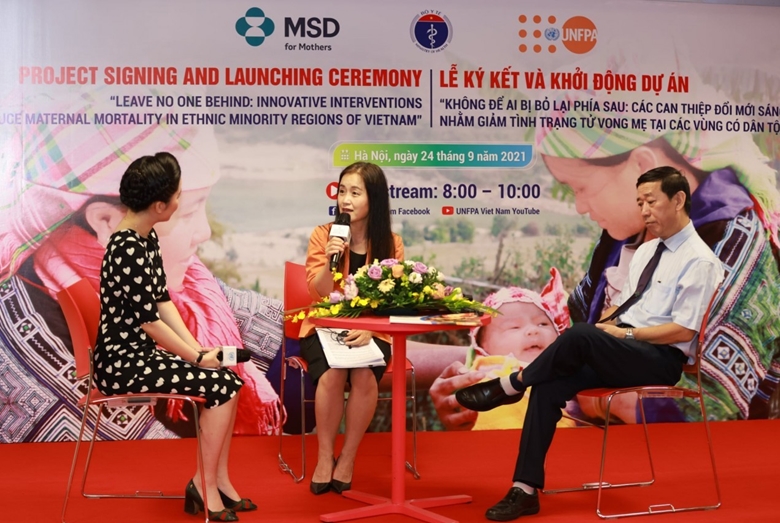Innovative interventions to reduce maternal mortality in ethnic minority regions in Vietnam
(LĐXH)- Women, especially pregnant women in 60 remote ethnic minority communes of six most disadvantaged provinces of Bac Can, Lai Chau, Son La, Dac Nong, Kon Tum and Gia Lai will benefit from innovative interventions to stop preventable maternal deaths.
This is the ultimate goal of the UNFPA Project “Leaving no one behind: Innovative interventions to reduce maternal mortality in ethnic minority regions in Vietnam” which was signed on Semtember 24 by Ms. Naomi Kitahara, UNFPA Representative for Vietnam, Ms Jennifer Cox, General Director, Merck Sharp & Dohme – MSD HH Viet Nam, a leading global biopharmaceutical company, and Dr. Mary-Ann Etiebet, MSD for Mothers Lead.
Funded by MSD for Mothers and MSD Vietnam in the amount of US$1.2 million, the Project is one of the most important initiatives to reduce maternal mortality among ethnic minorities in six provinces in Vietnam’s Northern Midlands and Mountains, and Central Highland regions through innovative interventions, paying close attention to special needs of ethnic minority women who are at risk of being left behind in the country’s sustainable development process. 

UNFPA will deliver the Project in collaboration with the Ministry of Health, Provincial Departments of Health in the selected provinces, and local civil society organizations in the period from 1 September 2021 to 30 September 2024. In addition to financial contributions from MSD for Mothers and MSD Vietnam, UNFPA commits to making its own contributions to the project in the amount of US$ 810,000, thus leading to the total project budget of US$2,010,000.
Viet Nam has made significant progress in improving sexual and reproductive health of the general population in the past 20 years, and was one of the only six countries in the world, which achieved, in 2015, the Millennium Development Goal - 5 (MDG5) on the reduction of maternal mortality. However, disparities and inequalities remain in access to and utilization of sexual and reproductive health services among different ethnicities and regions.
Current evidence shows that while the maternal mortality ratio has declined to 46 maternal deaths per 100,000 live births at the national level, it still remains as high as 100-150 per 100,000 live births in mountainous and ethnic minority regions, particularly in Northern Midlands and Mountains, and Central Highlands.
Among all maternal death cases, maternal mortality is extremely high in some vulnerable ethnic minority groups, for instance Mong (60%) and Thai (17%). It is estimated that the risk of Mong’s mothers dying from pregnancy or childbirth is 4 times higher than the Kinh- the majority group.
More than half of the maternal deaths are happening at district and provincial hospitals due to limited capacities of health care facilities to manage maternal complications. In addition, remote and hard-to-reach geographical locations, low socio-economic conditions, cultural barriers and a limited understanding of maternal complications are also contributing factors to high maternal mortality.
The Project aims at increasing access to and utilization of integrated, quality and voluntary sexual and reproductive health services amongst ethnic minorities; improving the capacity on emergency obstetric care management in remote mountainous localities; and building a village-based birth attendant network in remote ethnic minority localities.
The Project will also integrate the Covid-19 prevention and control into the existing sexual and reproductive health programme. In light of digital transformation, innovative interventions also include the development and operation of tele-health, including internet-based smart phone Apps to improve the delivery of sexual and reproductive health services in ethnic minority localities.
The Project will also deliver innovative health education and community mobilization to ethnic minority communities to promote safe maternal deliveries.
Speaking at the event, Ms. Naomi Kitahara, the UNFPA Representative for Vietnam stressed that the signing to launch the Project funded by MSD for Mothers and MSD Vietnam constitutes another landmark step in UNFPA’s work to support women and girls, especially those in the remote areas with ethnic minority communities in Vietnam.
Meanwhile, Ms Jennifer Cox. General Director, MSD HH Vietnam said: “We are proud to collaborate with our longstanding partner - UNFPA in kicking-start this MSD for Mothers program “Leave no one behind” investing in innovative interventions to reduce maternal mortality in ethnic minority regions of Vietnam, working towards reaching the UN’s Sustainable Development Goals. We believe this project will bring tangible benefits to women in Vietnam and set the foundation for communities and societies to thrive for generations to come.”
Mr. Nguyen Duc Vinh, Director of the Maternal and Child Health Department, Ministry of Health confirmed the support of the Ministry to the project. He added: “To improve the health status of people who left behind including ethnic minorities is the centre of the government’s development agenda. Lessons learned and best practices drawn from this initiative will help the Ministry of Health to effectively implement the national action plan on maternal, neonatal and child health for period 2021-2025 with vision towards 2030 to achieve SDG targets on health care”.
UNFPA, as the lead UN agency for sexual and reproductive health, is working towards achieving a Viet Nam with zero preventable maternal deaths, zero unmet need for family planning, and zero gender-based violence and other harmful practices for women and girls./.
Nguyen Thin
-
 Minister Dao Ngoc Dung received the ASEAN’s General Secretary
24-04-2024 10:38 35
Minister Dao Ngoc Dung received the ASEAN’s General Secretary
24-04-2024 10:38 35 -
 Ha Nam province promotes career orientation for students
23-04-2024 14:28 49
Ha Nam province promotes career orientation for students
23-04-2024 14:28 49 -
 Hundreds of job opportunities for people with disabilities in Hanoi
17-04-2024 10:22 29
Hundreds of job opportunities for people with disabilities in Hanoi
17-04-2024 10:22 29
-
 Minister Dao Ngoc Dung received the Chairman of the Korea International Cooperation Agency
21-03-2024 14:14 48
Minister Dao Ngoc Dung received the Chairman of the Korea International Cooperation Agency
21-03-2024 14:14 48 -
 MoLISA proposing Japan to expand occupations to receive Vietnamese workers
18-03-2024 11:12 55
MoLISA proposing Japan to expand occupations to receive Vietnamese workers
18-03-2024 11:12 55 -
 Promote labour relations between Vietnam and Hungary
18-03-2024 09:55 15
Promote labour relations between Vietnam and Hungary
18-03-2024 09:55 15
English Review


Minister Dao Ngoc Dung received the ASEAN’s General Secretary
English Review | 24-04-2024 10:38 35







